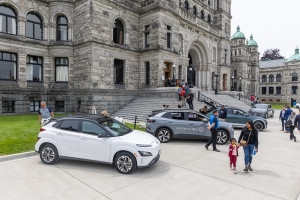Clean Energy Canada | Proposed update to B.C.’s EV mandate presents smart tools for automakers and consumers alike but undermines them with one stipulation
November 18, 2025

VICTORIA — Joanna Kyriazis, director of policy and strategy at Clean Energy Canada, made the following statement in response to a proposed update of B.C.’s EV mandate.
“It’s good news for British Columbians that the B.C. government is keeping in place its EV mandate, with some adjustments. At a fundamental level, the EV mandate is a policy that works on behalf of British Columbians by ensuring more families have the option to drive a cost-saving EV, making it both a climate measure and an affordability one.
“The policy has already led to B.C. receiving desirable EV models before other provinces and U.S. states, for example, and encourages automakers to bring more affordable electric cars to the B.C. market in order to keep up with its requirements. B.C.’s historically high EV adoption rate, driven in large part by the EV mandate, has also resulted in a more robust used EV market, making money-saving electric cars more accessible for more British Columbians.
“Given recent political headwinds, however, a recalibrated policy makes sense. Carmakers are looking for short-term relief and more flexibility to meet their targets while navigating tariffs, and consumers facing high costs of living need more help unlocking the long-term savings EVs provide.
“We are particularly pleased to see the introduction of a ZEV Affordability Program in 2026 that will reward automakers with additional credits for lowering vehicle prices, offering zero- or low-interest financing, and helping with charging. While the devil will be in the details, upfront cost continues to be the number one barrier keeping would-be EV buyers from making the switch—even though many consumers know an electric car would save them money in the long run.
“Indeed, transportation is the second-largest household expenditure that Canadians endure, and while housing and grocery-store shrinkflation have been difficult beasts to tame, when it comes to the cost of driving, there actually is something of a silver bullet. And it’s one the rest of the world is rapidly benefiting from as North America drags its anchor. More than one in four cars sold globally this year is projected to be electric.
“Which is why one particular stipulation in today’s announcement gives us cause for concern. The province’s ‘strong view’ that B.C. should be no more ambitious than Canada as a whole when it comes to setting adoption targets risks undermining the entire policy. B.C. has always led the charge, alongside Quebec, when it comes to EV adoption. Put simply, the province already has a head start, from more EVs on the road, to a better charging network, to higher public awareness of the benefits of EVs. One should not expect EV adoption in Metro Vancouver—which hit 27% last year—to mirror EV adoption in northern Saskatchewan. With some of the cheapest and cleanest electricity in the country, a more temperate climate, and more advanced EV infrastructure already in place, B.C. absolutely should expect and aim for higher EV adoption than Canada on average.
“British Columbians are already more likely than all Canadians to say they intend to get an electric car next, and this is especially the case in the Lower Mainland. Seven in 10 Metro Vancouverites are inclined to get an EV as their next car.
“This government has kept B.C. drivers in the front seat for many years now, and we’re hopeful that the province still has its priorities straight. Today’s announcement smartly identifies new roads to get there—ones that could benefit automakers and consumers alike—but a single stipulation leaves us wondering whether B.C. will put its foot on the accelerator of its own thoughtfully constructed policy vehicle.
“B.C., Quebec, and California have never waited for other provinces or U.S. states to catch up with us before. We shouldn’t start now—just as we’re falling behind the rest of the world.”